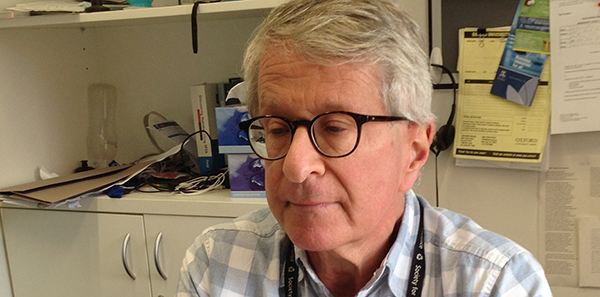1:30min

Associate Professor Larry Abel
Photo: University of Melbourne Department of Optometry and Vision Sciences
_____________________________
By Helen Carter
Journalist
A new online postgraduate course will enable optometrists to extend their abilities to assess and manage patients with neuro-ophthalmic disorders.
The University of Melbourne, Department of Optometry and Vision Sciences is planning to offer the Specialist Certificate in the Management of Neuro-Ophthalmic Disorders in semester two. The certificate can contribute to the university’s Master of Clinical Optometry.
The co-ordinator of the certificate, Dr Kwang Cham, said it was designed to enable optometrists to extend their abilities to evaluate the sensory and motor pathways of the visual system, both in evaluating visual complaints themselves and gaining further knowledge of how visual and ocular motor signs may reflect a range of systemic conditions, particularly of the central nervous system.
‘Because complaints related to these pathways may reflect problems arising anywhere from the anterior visual pathways to the higher-order visual cortices, optometrists should benefit from gaining a deeper understanding of the current state of knowledge of these pathways and their assessment,’ he said.
Testing service
The department offers the only clinical ocular motor testing laboratory service in Australia and now provides clinical support from engineer, Associate Professor Larry Abel, who heads the Eye Movement Laboratory in the department.
Clinical ocular motor testing examines the position of the eye down to a fraction of a degree, sampling every 1/500th of a second.
Professor Abel has many years of experience offering this novel service and in 2015, several of his eye movement assessments were moved to UM EyeCare.
‘This enabled students to gain enhanced exposure and access to neuro-ophthalmic evaluations. Final-year students are now part of the neuro-ophthalmic clinical work-ups, creating a lasting interest in this important assessment area,’ head of the department, Professor Allison McKendrick said.
UM EyeCare clinic director Associate Professor Daryl Guest is urging optometrists to refer patients with eye movement problems who might benefit from the testing.
‘Optometrists can refer any ocular movement anomaly that they would like quantified,’ he said. ‘Commonly we receive nystagmus patients looking at whether surgery would be of benefit including documenting null points. This leads to better treatment as it is not possible to determine the exact sort of nystagmus without a recording.
‘Patients of all ages can have their ocular oscillations recorded, enabling identification of various types of nystagmus.
‘The speed, accuracy and timing of saccades in each eye can be assessed and can also be used in the work-up of patients with disorders such as internuclear ophthalmoplegia or ocular myasthenia.
‘The testing has also been used to explain visual symptoms and phenomena caused by the eye movements. We have had examples of patients who had fluctuating vision. By quantifying variable eye movement anomalies, we could explain the fluctuating vision and exclude other pathology,’ Professor Guest said.
A detailed report including snapshots of eye movement recordings is forwarded to the referring optometrist or ophthalmologist for clinical management.
‘Larry has a thorough understanding of the impact of eye movement anomalies on vision and these reports can often guide the ophthalmic practitioner in future management,’ Professor Guest said.
Optometrists with patients who would benefit from eye movement testing and analysis can contact UM EyeCare on 03 9035 6666 or email the clinic on uni-eyecare@unimelb.edu.au.
Information on the Specialist Certificate in the Management of Neuro-Ophthalmic Disorders is available online.
It is one of two specialist certificate courses being offered in semester two, starting on 25 July, both of which can contribute to the Master of Clinical Optometry. The other is the Specialist Certificate in the Management of Paediatric Patients.